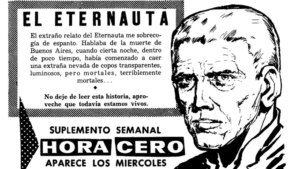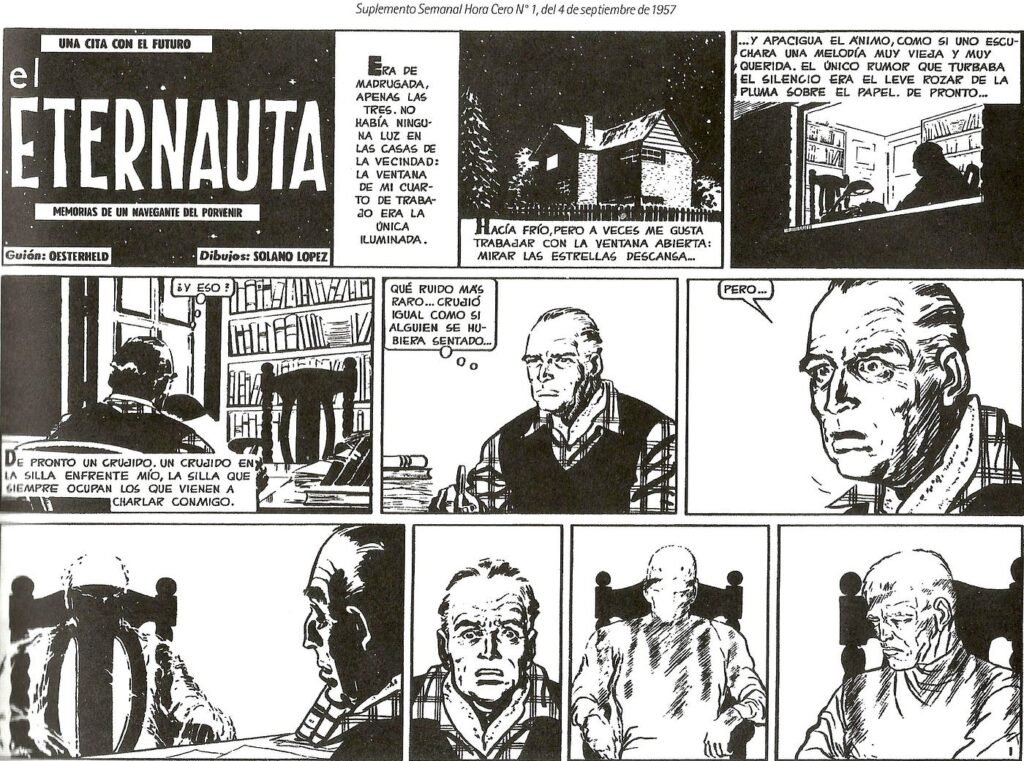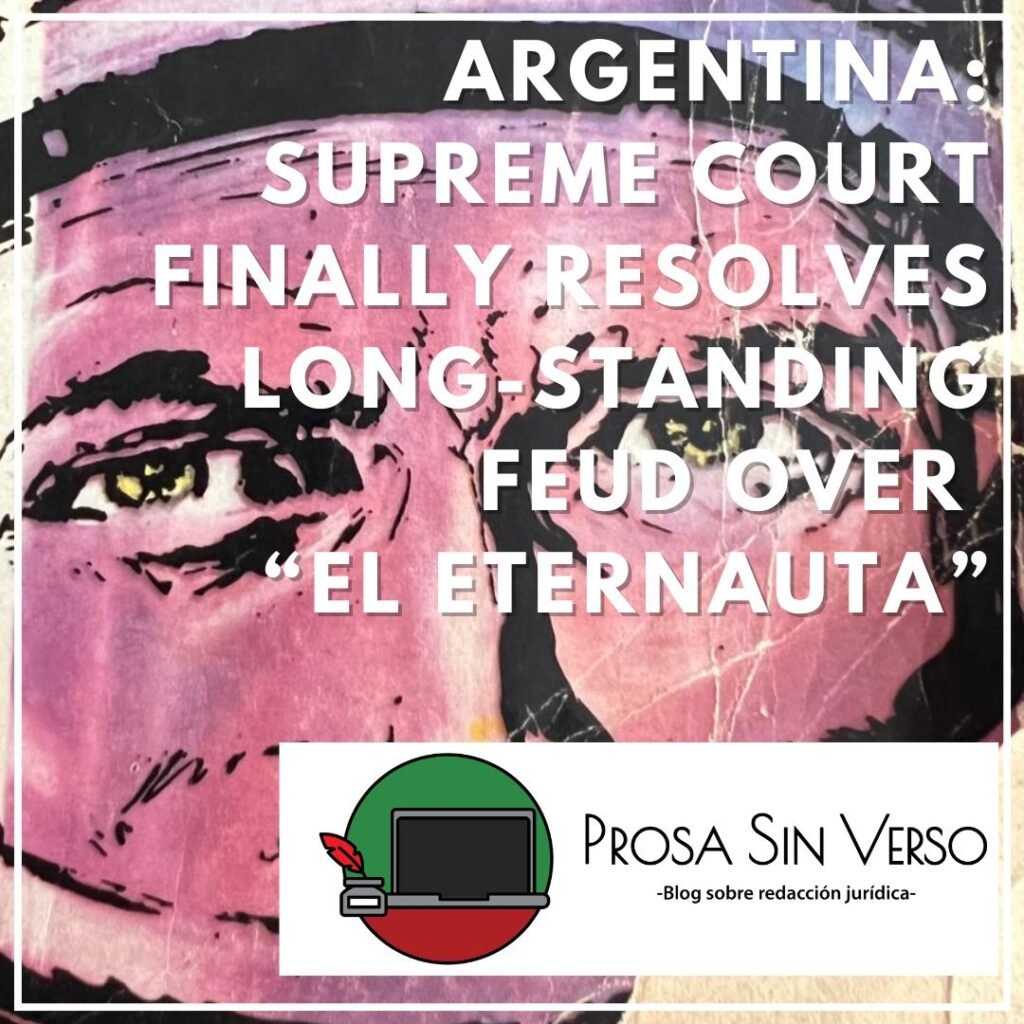
Crowning a saga well suited to the copyright and trademark at stake –“El Eternauta” is a coined word that can be translated as “The traveler of eternity” or “The Eternaut”– on July 10, 2018 the Supreme Court of Argentina, relying on the plaintiffs’ copyright, issued a sentence which, inter alia, canceled the defendant’s unauthorized registrations of trademarks matching said copyright. The suit had been filed in September 2000 but the legal dispute between the parties had begun long before, in December 1988. By the time the final decision was delivered, the original parties, that is the lead plaintiffs and the owner of the defendant firm, had all died.

The issue
“El Eternauta” was a very successful sci-fi comic strip created in 1957 by Héctor Oesterheld, as the writer, and Francisco López, as the illustrator, which ran until 1959 and was reissued in 1961; over the years several remakes and sequels ensued. The original plot described the struggle of a handful of survivors when Buenos Aires, at some point in the future, is attacked by extraterrestrials with a deadly snowfall. Juan Salvo, the lead character, travels through time to recount the story to the author Oesterheld, who plays a role in his own fiction. “El Eternauta II”, Oesterheld’s 1976 follow-up, acquired more openly political overtones.
In 1975 Oesterheld had handed over 360 original pages of the comic strip to two printers, who in turn assigned them to Ediciones Record (the defendant in this suit). In 1977 Oesterheld was “disappeared”, as did his four daughters, and was later officially declared to have died on April 1, 1978. In 1980 his widow, Elsa Sánchez, authorized Record to use the name and the characters of the work only to arrange the strip “El Eternauta III” in exchange for $4,000. Two years later, in July 1982, Mrs. Sánchez, acting on her own behalf and as administrator of Oesterheld’s estate, assigned the copyright in the works “El Eternauta I” and “El Eternauta II” yet again to Record, this time for $35,000. Only five months later Record assigned all the movie and audiovisual rights in the strip “El Eternauta” to Eidoscope S.r.l., an Italian firm, for a whopping $4,000,000.
The lawsuits
In December 1988 Mrs. Sánchez sued Record to have the 1982 agreement declared invalid, arguing inter alia her state of confusion and economic need at the time said agreement had been signed. The district court ruled in her favor in 1994 on the basis of section 954 of the Civil Code in force at the time, which provided that the cancellation or amendment of a legal act could be requested when one party took advantage of the other party’s state of need, lightness or inexperience, and thereby obtained an evidently disproportionate and unjustified economic advantage; and that this situation was to be presumed, unless there was proof to the contrary, when there was a notable lack of proportion between the reciprocal undertakings. (This provision has been since replaced, in almost identical terms, by section 332 of the current Civil and Commercial Code.) The ruling became final when it was affirmed by the Court of Appeals in 1996.
On the basis of these court decisions Mrs. Sánchez signed a publishing agreement with another publisher for the work “El Eternauta: El mundo arrepentido” (“The Eternaut: The repentant world”), only to find that Record was to send them a cease-and-desist letter citing two trademark registrations, respectively for word mark “EL ETERNAUTA” and a device mark for the iconic character of Juan Salvo , both in International Class 16.
In consequence Mrs. Sánchez, her two grandsons (heirs to Oesterheld’s estate) and Mr. López (the author of the artwork) sued Record, seeking that these two registrations be assigned to them (action in replevin) and, failing this, that they be cancelled. They also requested that Record’s oppositions against their own applications they had filed for “EL ETERNAUTA” in Classes 16, 25 and 28 be dismissed, and that their oppositions against Record’s application “EL ETERNAUTA” in Class 38 be upheld. In support of their requests the plaintiffs argued the cancellation of the 1982 copyright assignment which had become final with the 1996 decision.
The rulings
The suit was dismissed by the district court on the grounds that the plaintiffs had no standing to sue as the rights in the work “El Eternauta” had been assigned, according to the official register, to Record. This decision was affirmed by the Federal Court of Appeals, who additionally rejected the plaintiffs’ later argument that the cancellation of the 1982 copyright assignment was res judicata, for having been introduced extemporaneously and, moreover, as being inapplicable to the case at hand because the two lawsuits had different objects, as one had referred to the cancellation of the assignment of the copyright and the other involved trademarks. The plaintiffs appealed to the Supreme Court, which brings us to the case we are commenting on here.
The Supreme Court reversed the Court of Appeals. To this end it first ruled that although the two suits at stake had different objects this did not preclude res judicata, since the 1996 sentence, now final, had rejected the same defense the defendant was using now, namely the assignment of Oesterheld’s copyright to Record, and the fact that the plaintiffs were now pursuing a different consequence from that same sentence made no difference to this conclusion. Then it went on to hold that “when the mark matches the name of the character or of the work, as is the case with the registrations of ‘El Eternauta’ and ‘El Eternauta’ (and device), then the right to obtain its registration as a trademark belongs to the author, and for someone else to do so this will have to be expressly authorized by the author of the work, something which has not happened here”.
The majority of the Supreme Court decided not to remand the case to the Federal Court of Appeals in order to issue a new sentence according to this ruling, but resolved instead, in view of the long time elapsed since the lawsuit had been filed (eighteen years!) to enter a final judgment on the merits. Accordingly, the Supreme Court canceled Record’s trademark registrations for “EL ETERNAUTA”, dismissed Record’s oppositions against the “EL ETERNAUTA” applications filed by the plaintiffs, and upheld the plaintiffs’ opposition against Record’s “EL ETERNAUTA” application.
The teachings
This decision to accept a copyright as sufficient grounds to invalidate an unauthorized trademark registration was in line with an old 1983 sentence from the same court, which it failed to cite expressly here although it was cited by the deputy Attorney General in her opinion.u0026nbsp; In said case (“La Casa del Café S.A. v. D.C. Comics Inc.”, delivered October 3, 1983) it had ruled that the owner of a copyright in the name and figure of a comic strip character was entitled to oppose a trademark application “as this does not contradict but instead integrates the provisions of [the trademark] law with other applicable provisions of the legal system in force”.
What the Supreme Court did not accept –and did not even look into– was the plaintiffs’ request that Record’s “EL ETERNAUTA” registrations be assigned to them, which had been their primary petition (their cancellation having been requested as an alternative). This possibility is mentioned in passing by section 11 of the Argentine trademark law (which refers to the domicile where notice of court actions may be served) and has been admitted occasionally by the courts.
Thus ended a lawsuit which took 18 years to reach a final decision; but overall the legal dispute lasted 30 years, seeing that the first suit filed by Mr. Oesterheld’s widow against Ediciones Record was filed in 1988. Almost an eternity.

